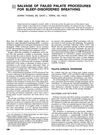 105 citations,
February 2011 in “The Journal of Clinical Endocrinology & Metabolism”
105 citations,
February 2011 in “The Journal of Clinical Endocrinology & Metabolism” Treating sleep apnea in young obese women with PCOS can improve heart health and insulin sensitivity.
 19 citations,
June 2016 in “Gynecological Endocrinology”
19 citations,
June 2016 in “Gynecological Endocrinology” Women with PCOS often have more sleep problems than the general population.
 129 citations,
January 2019 in “Clinical medicine insights”
129 citations,
January 2019 in “Clinical medicine insights” Obesity worsens PCOS symptoms, and PCOS may lead to more weight gain; managing both requires a holistic approach that includes mental health.

Losing weight and eating better are key to managing metabolic syndrome and its related conditions.
 92 citations,
May 2014 in “The American Journal of Medicine”
92 citations,
May 2014 in “The American Journal of Medicine” The conclusion is that early diagnosis and a multi-system treatment approach are crucial for managing PCOS and its associated health risks.
9 citations,
September 2019 in “Journal of clinical sleep medicine” Vitamin B12 deficiency can rarely cause excessive daytime sleepiness.
 December 2018 in “Evidence-Based Practice”
December 2018 in “Evidence-Based Practice” Topical minoxidil 1% and 2% are twice as effective as placebo for female pattern hair loss.
 June 2016 in “CRC Press eBooks”
June 2016 in “CRC Press eBooks” Sleep problems and skin issues affect each other; poor sleep can worsen skin conditions, and some skin treatments can improve or harm sleep quality.
 December 2002 in “Operative Techniques in Otolaryngology-Head and Neck Surgery”
December 2002 in “Operative Techniques in Otolaryngology-Head and Neck Surgery” Hair loss from trauma can be managed using scalp expansion, flaps, and hair transplants to improve appearance and well-being.
 1 citations,
January 2022 in “Monaldi archives for chest disease”
1 citations,
January 2022 in “Monaldi archives for chest disease” After severe COVID-19, lung damage can improve, detected effectively by lung-ultrasound, and high pressure support during hospitalization can increase lung artery size. Also, about 22% of patients had lung blood clots, and when treated, they recovered faster.
 18 citations,
April 2021 in “Experimental Dermatology”
18 citations,
April 2021 in “Experimental Dermatology” COVID-19 may cause hair loss and scalp pain due to inflammation and changes in hair follicle receptors, but these symptoms typically resolve in 2 to 4 months.
 1 citations,
August 2021 in “Internal Medicine Journal”
1 citations,
August 2021 in “Internal Medicine Journal” After severe COVID-19, 71% of patients experienced excessive hair shedding and thinning within 3 months due to factors like low oxygen levels, medication, stress, and autoimmune disease.
66 citations,
March 1998 in “Mayo Clinic Proceedings” Removing a testosterone-producing tumor cured a woman's sleep apnea and other symptoms.
 June 1996 in “Irish Journal of Medical Science (1971 -)”
June 1996 in “Irish Journal of Medical Science (1971 -)” The document summarizes medical findings on topics like heart rhythm treatment, sleep apnea therapy, and various health conditions and treatments.
1 citations,
March 2022 in “Irish Journal of Medical Science” Men with androgenetic alopecia and hypertension may experience more severe COVID-19.
1 citations,
January 2021 in “Wits Journal of Clinical Medicine” Long COVID causes lasting symptoms and needs ongoing care.
 56 citations,
April 2015 in “American journal of medical genetics. Part A”
56 citations,
April 2015 in “American journal of medical genetics. Part A” Patients with Bohring-Opitz syndrome and ASXL1 mutations need regular kidney ultrasounds to check for tumors.

There is no cure for myotonic dystrophy type 1, so treatment focuses on managing symptoms and complications.
 1250 citations,
August 2021 in “Scientific Reports”
1250 citations,
August 2021 in “Scientific Reports” COVID-19 leaves 80% of patients with long-term symptoms like fatigue and headaches.
 November 2024 in “Frontiers in Medicine”
November 2024 in “Frontiers in Medicine” Cirrhosis affects quality of life with various symptoms, requiring a holistic, multidisciplinary approach for management.
 July 2019 in “Mayo Clinic proceedings”
July 2019 in “Mayo Clinic proceedings” The man's fatigue and erectile dysfunction were improved by treating his obesity-related low testosterone without needing testosterone replacement.
98 citations,
March 2019 in “Frontiers in immunology” Damaging mutations in NFKB2 cause a severe and distinct form of primary immunodeficiency with early-onset and often ACTH-deficiency.
 20 citations,
August 2022 in “Archives of Medical Science”
20 citations,
August 2022 in “Archives of Medical Science” The Polish medical societies have redefined metabolic syndrome and recommend lifestyle changes, certain medications, and possibly bariatric surgery for treatment. They also discuss managing related health conditions.
 March 2023 in “Seminars in reproductive medicine”
March 2023 in “Seminars in reproductive medicine” PCOS often leads to sleep problems, especially obstructive sleep apnea, affecting overall health.
 60 citations,
October 2014 in “Journal of the American Academy of Dermatology”
60 citations,
October 2014 in “Journal of the American Academy of Dermatology” Dermatologists play a key role in treating skin symptoms of PCOS like dark patches, excess hair, acne, and hair loss.
 90 citations,
January 2021 in “Clinical Endocrinology”
90 citations,
January 2021 in “Clinical Endocrinology” Obesity increases the risk of developing polycystic ovary syndrome, and weight loss can improve the condition.
 September 2023 in “International journal of science and healthcare research”
September 2023 in “International journal of science and healthcare research” Genetic testing is crucial for diagnosing congenital atrichia, a rare condition causing irreversible hair loss.
11 citations,
September 2021 in “American Journal of Medical Genetics Part A” Four new cases of Bachmann-Bupp syndrome suggest potential for targeted treatment.
 4 citations,
January 2019 in “Therapeutic Advances in Endocrinology and Metabolism”
4 citations,
January 2019 in “Therapeutic Advances in Endocrinology and Metabolism” Medications for PCOS don't seem to raise heart disease risk.
 October 2007 in “Current Respiratory Medicine Reviews”
October 2007 in “Current Respiratory Medicine Reviews” Women with PCOS are much more likely to have sleep problems and should be checked for them.
























